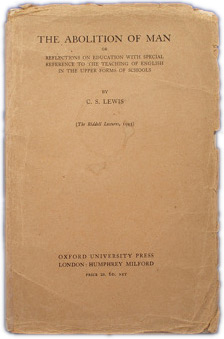 Our culture clamors for honor – – while making character impossible. It is hypocritical to say that nothing defines what is true and noble – – and then ask young people to act in ways that are decent and good.
Our culture clamors for honor – – while making character impossible. It is hypocritical to say that nothing defines what is true and noble – – and then ask young people to act in ways that are decent and good.
C.S. Lewis:
Such is the tragi-comedy of our situation – – we continue to clamour for those very qualities we are rendering impossible. You can hardly open a periodical without coming across the statement that what our civilization needs is more ‘drive,’ or dynamism, or self-sacrifice, or ‘creativity.’ in a sort of ghastly simplicity we remove the organ and demand the function. We make men without chests and expect of them virtue and enterprise. We laugh at honour and are shocked to find traitors in our midst. We castrate and bid the geldings be fruitful.
C.S. Lewis and His Last Hurdle to Belief
The Possibility of Short Term Defeat Makes the Adventure
Christianity is Not the Sort of Thing Anyone Would Have Made Up
Lewis’ “The Abolition of Man” is probably my favorite book on education. His analysis of a culture that encourages “brains and loins” but denies “the heart” that connects the two is a devastating critique of secular humanism.
I have also sometimes wondered if there is also an application to contemporary Christianity that encourages Theology (head) and Rock music (hips) but denies any connection between the two. Could some of our problem be that we inadequately address the heart and soul in our giving people knowledge and a beat to dance to?
I think a lot about his contrast of wisdom and magic/technology. There is a strong tendency in the modern world to view education as the effort of learning how to bring reality into subjection to our desires rather than bringing our desires into subjection to reality.
Very well said on your part Tim.
I was required to read the Abolition of Man for a CE class in seminary: History and Philosophy of CE I think. It was a tremendous help to be pointed to such good books.